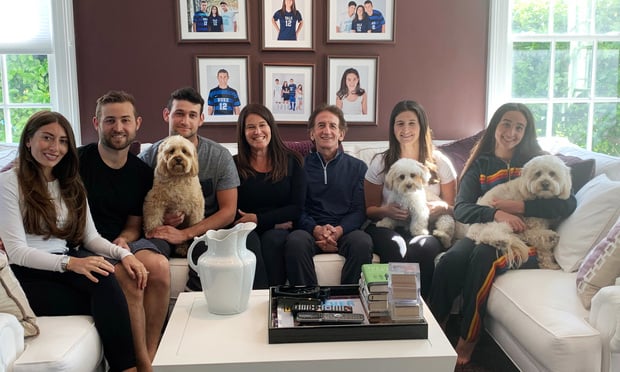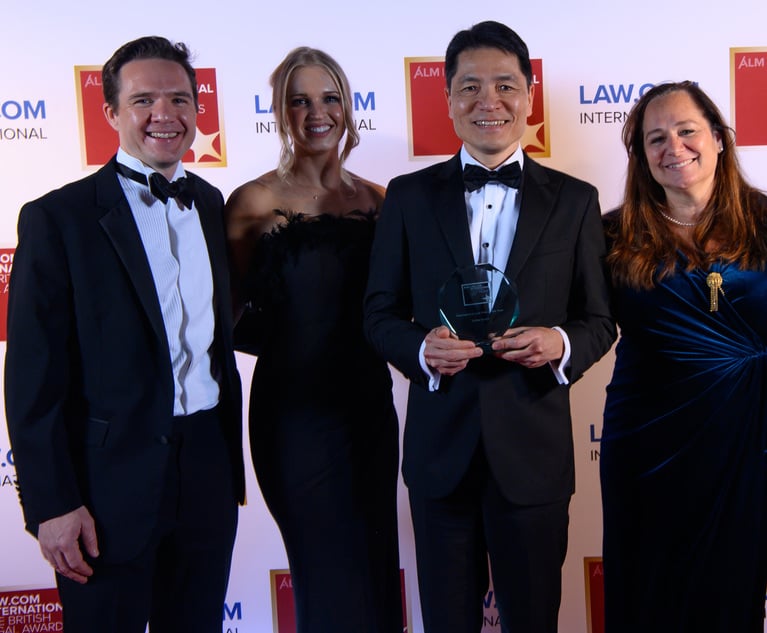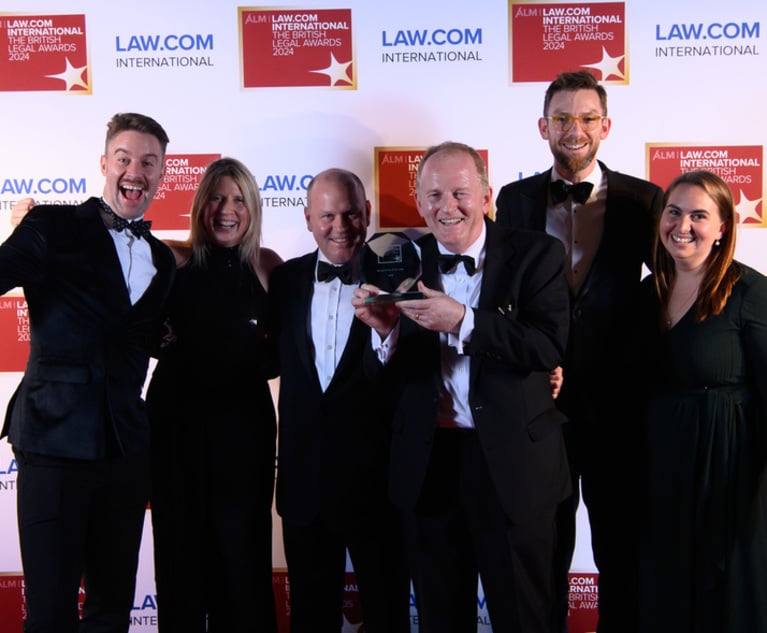7 People, 4 Lawyers, 3 Dogs and Spotty Wi-Fi: In Quarantine With O'Melveny Chairman Brad Butwin
At 63 straight family dinners and counting, the Butwin clan is finding challenges and rewards.
May 19, 2020 at 05:54 PM
6 minute read
The original version of this story was published on The American Lawyer
 Bradley Butwin, of O'Melveny & Myers, center, with his family. (Courtesy photo)
Bradley Butwin, of O'Melveny & Myers, center, with his family. (Courtesy photo)
Many families have gathered together to weather self-isolating mandates across the country.
But few could match the legal—and canine—congregation now assembled under the Long Island, New York roof of O'Melveny & Myers' Bradley Butwin.
Since March 13, the Butwin address in Nassau County has been Big Law's "Full House." Along with Butwin, who was just reelected to another term as O'Melveny's chairman, it's now home to Randi, Butwin's wife of 31 years; his oldest daughter Jenny, who is a first-year associate at Davis Polk & Wardwell; sons Alex and Jake, recent Fordham Law grads who are headed to Paul, Weiss, Rifkind, Wharton & Garrison and Proskauer Rose, respectively; Jake's fiancé (they decided to delay their pending wedding due to the pandemic); his youngest daughter, a high school junior; and three dogs: Brady, Bailey and Benji.
The American Lawyer caught up with the O'Melveny leader to discuss life at the Butwin place, including hot-button issues such as what's for dinner, who gets Wi-Fi priority and how to handle competition when lawyers dominate the family.
It's been two months since you got this group under one roof. How's that going?
The house requires extensive coordination and lots of quiet time. Our protocol is to start with a group chat in the morning and find out who needs quiet time and when. We then see how legitimate each request is—so something like conducting a town hall or taking a test. Then we have to figure out what level of silence they need, like if someone needs to be on dog duty (they get very excited when deliveries arrive). Then we decide which Wi-Fi system we will use. We have two: One is for important business matters and the other is for everything else.
This has worked out pretty well, with a few exceptions. For instance, my older son inadvertently introduced himself to my daughter's teacher while he was half-dressed. But we have avoided disaster for the most part.
As someone who prioritizes food, I'm curious how dinner arrangements work out.
It's been two months. Tonight will be our 63rd family dinner in a row, which could be more than we have had our entire lives. We were always so busy we never had the time. The tables have turned now.
Dinner is a negotiated issue. It's a major deal as to what we stock in the refrigerator. We cook every night, maybe a couple of times we have ordered in. It starts as a group text, and if you are late to the party, you may just miss out. There are a lot of different interests. My wife is the ultimate arbiter; she is the one who decides. It is a lengthy process.
We have a nice rotation when it comes to cooking, where everyone helps out, save me and Jenny.
If we are doing takeout, Randi generally coordinates. If we grill, it is my sons. It is impressive how good they are on the grill. Homestyle cooking is my future daughter-in-law, who is fantastic.
In the nonpandemic world, I had client meetings almost every night—dinners that ended at 11, and then early breakfasts the next morning. So this is nice.
What do you guys talk about around the table?
My three lawyers come to the dinner table each night with the latest law industry gossip, including from The American Lawyer. They all cross-examine me as to whether certain rumors are true. They know I talk to other law firm chairs from time to time regarding best practices on creating a safe work environment and how firms might reopen. I also ask them questions, like about remarks I plan to make at a town hall. It's good, because they have a different lens than I do.
Let's talk about challenges. What has come up in the time you have all been home?
Keeping a boundary between me running a law firm, my daughter working at one and my sons needing time for bar review … boundaries are important. My kids are naturally snooping around for buzz in the industry. I didn't really think about this before talking to you, but my kids are stakeholders in the decisions I am making for my firm. They read the press, and it is a challenge.
The other challenges, and this is admittedly a first-world issue, are what is for dinner and spotty Wi-Fi reception. That has been a source of frustration.
You guys are a pretty competitive group. How is that manifesting?
This is a competitive family. My wife played professional tennis, and my three oldest kids played Division I soccer. There have been very competitive games in things you wouldn't think would be so competitive. Like cards. I can tell who wins by who's scream I hear. We also play ping-pong, basketball and beer pong. I have a standing game of horse with my youngest daughter. There is also some less competitive stuff like baking, yoga and walks with the pups.
There haven't been any real fights, but there has been some dislocation. We've had two graduations canceled, an ACT rescheduled, two bar exams rescheduled and a son and daughter-in-law that have postponed their marriage ceremony until next year. So, there are real-world things going on that we are dealing with, but they are of course nothing compared to some of the real devastation felt out there.
What happens when this is all over?
As a practical matter, just as the pandemic is a once in a century issue, I think this is a once in a lifetime opportunity for us. I would like to say that we will continue to be together as much as we are now, but the reality is this is a really busy family doing things that require their attention. While I would hope there are more family dinners, I would expect to go back to seeing everyone when they come home for Sunday football.
This conversation was lightly edited.
Read More
Pay Cuts, Layoffs, and More: How Law Firms Are Managing the Pandemic
How Law Firms Can Engage and Support Their Workforces During COVID-19
This content has been archived. It is available through our partners, LexisNexis® and Bloomberg Law.
To view this content, please continue to their sites.
Not a Lexis Subscriber?
Subscribe Now
Not a Bloomberg Law Subscriber?
Subscribe Now
NOT FOR REPRINT
© 2025 ALM Global, LLC, All Rights Reserved. Request academic re-use from www.copyright.com. All other uses, submit a request to [email protected]. For more information visit Asset & Logo Licensing.
You Might Like
View All
International Law Firm of the Year: A Q&A with Sidley Austin's London Managing Partner
5 minute read
Inside Travers Smith's AI Training, Development Efforts

From Olympic Aspirations to Legal Innovation: Tom Dunlop's Journey to Founding Summize
8 minute readTrending Stories
- 1Supreme Court Appears Sympathetic to Law Requiring Porn Sites to Verify Users' Age
- 2Cybersecurity Breaches, Cyberbullying, and Ways to Help Protect Clients From Both
- 3AI in 2025: Five Key Predictions on How It Will Reshape International Law Firms
- 4Justice Known for Asking 'Tough Questions' Resolves to Improve Civility
- 5Robinson & Cole Elects New Partners and Counsel
Who Got The Work
J. Brugh Lower of Gibbons has entered an appearance for industrial equipment supplier Devco Corporation in a pending trademark infringement lawsuit. The suit, accusing the defendant of selling knock-off Graco products, was filed Dec. 18 in New Jersey District Court by Rivkin Radler on behalf of Graco Inc. and Graco Minnesota. The case, assigned to U.S. District Judge Zahid N. Quraishi, is 3:24-cv-11294, Graco Inc. et al v. Devco Corporation.
Who Got The Work
Rebecca Maller-Stein and Kent A. Yalowitz of Arnold & Porter Kaye Scholer have entered their appearances for Hanaco Venture Capital and its executives, Lior Prosor and David Frankel, in a pending securities lawsuit. The action, filed on Dec. 24 in New York Southern District Court by Zell, Aron & Co. on behalf of Goldeneye Advisors, accuses the defendants of negligently and fraudulently managing the plaintiff's $1 million investment. The case, assigned to U.S. District Judge Vernon S. Broderick, is 1:24-cv-09918, Goldeneye Advisors, LLC v. Hanaco Venture Capital, Ltd. et al.
Who Got The Work
Attorneys from A&O Shearman has stepped in as defense counsel for Toronto-Dominion Bank and other defendants in a pending securities class action. The suit, filed Dec. 11 in New York Southern District Court by Bleichmar Fonti & Auld, accuses the defendants of concealing the bank's 'pervasive' deficiencies in regards to its compliance with the Bank Secrecy Act and the quality of its anti-money laundering controls. The case, assigned to U.S. District Judge Arun Subramanian, is 1:24-cv-09445, Gonzalez v. The Toronto-Dominion Bank et al.
Who Got The Work
Crown Castle International, a Pennsylvania company providing shared communications infrastructure, has turned to Luke D. Wolf of Gordon Rees Scully Mansukhani to fend off a pending breach-of-contract lawsuit. The court action, filed Nov. 25 in Michigan Eastern District Court by Hooper Hathaway PC on behalf of The Town Residences LLC, accuses Crown Castle of failing to transfer approximately $30,000 in utility payments from T-Mobile in breach of a roof-top lease and assignment agreement. The case, assigned to U.S. District Judge Susan K. Declercq, is 2:24-cv-13131, The Town Residences LLC v. T-Mobile US, Inc. et al.
Who Got The Work
Wilfred P. Coronato and Daniel M. Schwartz of McCarter & English have stepped in as defense counsel to Electrolux Home Products Inc. in a pending product liability lawsuit. The court action, filed Nov. 26 in New York Eastern District Court by Poulos Lopiccolo PC and Nagel Rice LLP on behalf of David Stern, alleges that the defendant's refrigerators’ drawers and shelving repeatedly break and fall apart within months after purchase. The case, assigned to U.S. District Judge Joan M. Azrack, is 2:24-cv-08204, Stern v. Electrolux Home Products, Inc.
Featured Firms
Law Offices of Gary Martin Hays & Associates, P.C.
(470) 294-1674
Law Offices of Mark E. Salomone
(857) 444-6468
Smith & Hassler
(713) 739-1250









